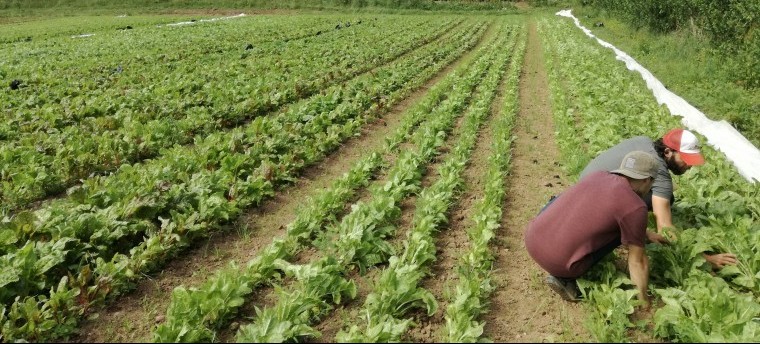The field lab, now in its second year, is investigating hot water seed treatment (HWST) as a non-chemical method of tackling the fungal disease in leafy green crops like chard.
The process involves heating seeds in water prior to planting and initial lab results had found it to be effective in killing off pathogens already present in the seed.
With support from the not-for-profit Innovative Farmers network, which enables farmer-led research, growers at Riverford have teamed up with the Organic Research Centre to test the approach in a real farm setting with environmental factors considered.
Crop yields were compared to an untreated control plot and seeds were also tested for three pathogens between HWST and planting. Result analysis from last year’s tests found pathogens to be almost eliminated with crop yields increased.
Ed Scott, Riverford grower, said: “The field lab results from last year were promising and found some benefits – the hot water treatment looks to be a useful tool in helping control leaf spot and improving crop yield. This also helps with labour savings as it is quicker to harvest the crops if there is less disease. However, 2018 was a particularly dry year with low levels of disease in general, so we are looking forward to comparing results to further trials this year.”
The 2018 results included:
- Seeds tested following HWST and prior to sowing showed 100% control of one pathogen (Alternaria), with less than 5% of seeds showing traces of the other two pathogens tested for (Cladosporium and Stemphyllium).
- The treated plants yielded an average of 25t/ha of crop, compared to 22 if untreated.
- 72% of the HWST crop was marketable on average, compared to 69% of the untreated crop.
- This meant at a chard price of £2 per kilogram, using treated seed could offer an additional £5,910 per hectare of crop over the course of a season.
- With reduced levels of disease, the crop is quicker to harvest, meaning a significant saving in labour costs.
- The treatment primed the seeds and crops established quicker.
Guy Singh-Watson, Riverford founder and organic farmer, said: “Farmer-led research is absolutely crucial as we are the ones on the ground and know our land better than anyone. At Riverford, we were honoured to take part in and host the latest trials into innovative crop protection and look forward to continuing in this important work. As more and more chemical products are withdrawn, ecological techniques like hot water seed treatment will become increasingly important. Conducting research on real farms proves the validity of the techniques in field settings and can give farmers and growers the confidence that they are viable and cost-effective solutions.”
Helen Aldis, Innovative Farmers development manager, said: “Farmer-led trials like this show just how important it is that agricultural research takes place on real farms, so it was great to have Riverford involved to look whether the technique can work in a successful business model. The hot water seed treatment trial is a great demonstration of how beneficial it is that field labs are designed to be practical for farmers while producing robust results that can be easily replicated. It was carried out using every day tools and, like all Innovative Farmers field labs, all of the findings and designs of the field lab are now shared open source for others to learn from.”
More information on this field lab is available on the Innovative Farmers website where anyone can sign up to the network for free and download the results report for the trial’s first year.
To find out more about field labs or suggest new ideas for farmer-led research, visit www.innovativefarmers.org.




